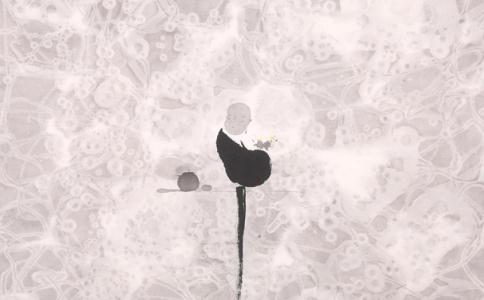为什么我们会有习惯这种东西呢?

我们可以用“慢,慢动作,分解动作”来处理习惯,这个慢和分解特别有意义。
“Slowing down” is a good method to deal with habits, and it has a special significance.
当我们遇到一件事情,如果它对我们的习惯性有一个直接的对抗,我们心里就会产生一个“急”——我们会急忙应战,就会产生急忙的结果。比如,我被人说了,心里不舒服,这个“不舒服”的习惯性反应会产生一个不舒服的结果——难受。
When something that challenges our habits happens we are usually in a hurry to react and it leads to immediate response. For instance, when we are being criticized, we directly feel uneasy and this reaction leads to direct result: uneasiness.
如果我们试着让它慢下来,把这个过程分解成若干段,结果就不一样了。我们去追究它的因缘,了解它的本质不可得,就会发现这只是个习惯罢了,完全可以淡化它,这样就宽容起来了。
But if we learn how to slow down and take some distance with our reactions, the result will be different. Once we trace back the discomfort to its origin, we can find it is illusory by nature, we find it’s just a habit which could be downplayed. Then forgiveness arises.
习惯
HABIT
习惯,就是心里太紧,绷得太紧了。如果我们宽松应对,就不一样了,这是从事相上解决。那再从本质上解决,从空性的角度来看,为什么我们会有这种东西呢?——习惯。
This habit comes from stress. If we deal with it with a relaxed mind, it will be a different story. Being relaxed means to solve the problem on the phenomenal level. But what if we could see its very nature, its emptiness? How come we have such feeling? It’s only a habit!
比如,有的人在大众中被人说或者被人看一眼,他就不舒服;有的人被人安排了,他也会不舒服。很多“不舒服”的习惯,实际是人紧张了,有时候并不见得是啥事情,但人会紧张。很多人在众中一被人说,本来很小的事,他就“哇”得受不了了——“你怎么在大众中说我呢?”实际啥事都没有,对不对?
You see, some people would feel uncomfortable if they are criticized or even watched in public; Some would feel uneasy, if they are commanded by others. The truth is that most uncomfortable feelings are just nervousness and embarrassment. It’s not a big deal, yet some will get nervous when they are scolded in front of others, which is really unbearable to them no matter how small the thing is. “How can you judge me in public?” Actually, it’s not a big deal. Right?
什么事来了,我们都慢一点。就算是已经来了,已经压到身上了,已经很急了,我们也要慢一点。我们尽量不让它紧张,先在事相上解决,安稳下来了,再从本质上解决。也就是事后解决,先安稳了,我们再来了解它——这是个习惯,我们释然于习惯,就好了!
So, no matter what we come across, try to slow the habitual reactions a little. Even if the matter is so urgent that it has already put pressure upon you, try to relax and slow down the problem-solving process. Don’t be nervous. We can fix it on the phenomenal level and settle down first, and then try to solve it on the essential level, which is to deal with it post-event. The first step is to settle down, the next step is to know that it is just a habit. There is nothing to worry about. So just relax and let it go.
从本质上观察最简单,我们真就会一笑了之:“哦,我习气来了,别人冲击我一下,我不舒服。”“这是他的习气,还是我的习气?”你一笑就过去了。因为什么呢?本来就是个不可得的事,大家都在那里演那么个梦幻的东西。如果我们一紧张,就急忙应战,心里想对付,这马上就产生相应的结果——不舒服。人们在这个地方的习惯作为太多了,一遇事马上就产生对抗,看着看着,又开始了,马上就又对抗了,就是个对抗的心理。
If we observe habits on the essential level, it is so simple that we can even laugh about it: “Here comes the habit. I am now feeling uncomfortable because of criticism.” Regardless of our habits or others, you will laugh it off. Because the habit is unobtainable by nature and it has a dreamlike quality. However, if we think “Oh my, I have to fight back!” This attitude leads to immediate discomfort! We are so familiar with the habit of resistance. Looking at the event, the feeling starts again. Resist immediately.
了解习惯,释然于习惯。我们一旦知道是习惯,就很释然放松了,最主要是释然于习惯。了解它的本质了,再了解它只是个习惯,再释然于习惯,哪怕让它发出来,都没问题了。
So, try to know your habit, then let go of it. Once you understand it is only a habit, you will feel relaxed. The key is to let go. So, understand the nature of habit, understand the habit itself, and let it go. Then it is no more a problem even though you may still lose your temper.
来自慈法法师的『生命之光 · 阳光早餐』
The Light of Life Sunshine Breakfast
2018年2月
原标题:习惯的处理 | 中英文
文章转自微信公众号:菩提眼
- 上一篇:平时应以什么样的心态来念诵三皈依?
- 下一篇:常观常自在——慈法法师开示《心经》
- 明安法师:大部分修行人悟后起修,时时观照渐除烦恼习气
- 仁德上人:修行过程之中为什么会翻出各种各样的习气种子?
- 仁德上人:看清承认自己的一切缺点习气毛病
- 仁德上人:只有彻底消除习气毛病才能够见性圆成佛道
- 仁德上人:七条对习气毛病重的人至诚劝告
- 静波法师:改变习气与毛病,让自己可爱起来
- 能弘法师:如何克制自己玩手机、看电视的习气?
- 慈法法师:学佛心智 学佛誓愿
- 仁德上人:改正缺点习气毛病要具备两个条件
- 慈法法师:心力就越来越弱,好像活着也没多大意思了怎么办?
- 慈法法师:在学佛还去爱憎就惨了
- 慈法法师:本净是对善知识最大的礼敬
- 慈法法师:闻净土教法即是不退之因缘
- 慈法法师:一颗真实的心——心念无诤
- 慈法法师:随顺得入,成就阿褥多罗三藐三菩提
- 慈法法师:世间安得双全法,不负如来不负卿
- 慈法法师:如何劝说年迈的父母皈依三宝?
- 慈法法师:是什么掩盖了我们圆满觉悟生命的需求?
- 慈法法师:很多经典讲了念佛、观佛的功过,念佛怎么会有过失呢?
- 慈法法师:“众生本来究竟圆满”,还需要发心利他吗?
- 星云大师:春有百花秋有月,夏有凉风冬有雪;若无闲事挂心头,便是人间好时节。
- 正如法师:念《心经》比《大悲咒》更好吗?
- 印光大师:安士全书白话解
- 净慧大师:净慧法师《楞严经》浅译
- 星云大师:星云大师谈《心经》
- 文珠法师:妙法莲华经
- 大寂尼师:一般人在家里可以读诵《地藏经》吗?
- 仁清法师:听说诵大悲咒对鬼不好,请法师开示
- 星云大师:解读普贤菩萨十大愿王(附普贤行愿品全文)
- 圣严法师:关于灵魂与鬼的终极真相
- 梦参法师:梦参老和尚:金刚经
- 惟觉法师:修行人应做到的三大精进
- 心律法师:吃亏是福
- 梦参法师:梦参老和尚讲地藏本愿经
- 心律法师:什么人与佛有缘?
- 文珠法师:大方广佛华严经
- 星云大师:千江映月
- 虚云法师:多诵读《普门品》和《地藏经》
- 星云大师:手把青秧插满田,低头便见水中天;六根清净方为道,退步原来是向前。
- 达摩祖师:《破相论》原文
- 永明延寿:宗镜录
- 正如法师:诵心经比大悲咒功德大吗
- 净善法师:净善法师:看风水与算命能否改变命运?
- 大安法师:无量寿经
- 未知:星云大师讲解
- 正如法师:梁皇宝忏 慈悲道场
- 明空法师:明空法师:《心经》中的般若智慧
- 印光大师:不科学的求子秘方,但是很灵验
- 星云大师:人身难得今已得,佛法难闻今已闻;此身不向今生度,更向何生度此身?
- 星云大师:朝看花开满树红,暮看花落树还空;若将花比人间事,花与人间事一同。
- 净界法师:打坐的时候该怎么念佛?
- 仁清法师:《大悲咒》的九种世间利益
- 正如法师:在家居士受五戒可以搭缦衣吗?
- 印光大师:命不好者求美好姻缘,有个简单方法
- 星云大师:人死后生命是怎样的?
- 星云大师:溪声尽是广长舌,山色无非清净身;夜来八万四千偈,他日如何举似人?
- 大安法师:大安法师讲解
- 明安法师:把握当下不后悔
- 星云大师:天为罗帐地为毡,日月星辰伴我眠;夜间不敢长伸足,恐怕踏破海底天。
- 净慧法师:净慧法师:《妙法莲华经》浅释
- 如瑞法师:身外之财终舍离,所造之业如影随
- 静波法师:佛法的中道观
- 济群法师:明心见性是怎么来的?利根是天生的吗?
- 如瑞法师:佛性不分南与北,为人不与比高低,广修福慧获法喜
- 本源法师:学习佛陀冥想静坐,就可以悟道成佛吗?
- 静波法师:深着虚妄法 坚受不可舍
- 济群法师:人为什么要摆脱痛苦和烦恼,目的是什么?
- 本源法师:出家人与在家信徒要保持距离,才能更好地度化众生
- 如瑞法师:什么是不善业,为什么要远离一切不善业?
- 明海法师:当业障现前时怎么办?随缘了业,究竟解脱
- 济群法师:如何面对喜欢吃喝玩乐,做不如法事情的朋友?
- 如瑞法师:每个人的福报都是自己修来的
- 本源法师:人与人之间的相处,要保持一定的距离
- 济群法师:佛教对世界的认识——因缘因果
- 如瑞法师:护念他人善用心,学佛慈悲须践行
- 本源法师:如何报答佛陀的恩德?依教奉行就是对佛最好的报恩
- 济群法师:真正完美的人生,需要具足这八种圆满
- 本源法师:只有无漏的福德,才是真正的功德
- 如瑞法师:印光大师是后世佛弟子学习的榜样
- 理海法师:无论哪种供养,都离不开善用一颗欢喜的心
- 如瑞法师:敬畏因果,努力修正自己的行为、语言和心念
- 正慈法师:一人独坐、内心空闲,无甚杂思
- 本源法师:皈依三宝是踏入佛门的第一步
- 静波法师:跳出三界得解脱
- 济群法师:如何呵护发起普利众生的愿心,使发心不消退?
- 觉真法师:人与众生的关系,是佛教伦理的核心和主体
- 本源法师:每个念佛人在极乐世界都有一朵莲花
- 济群法师:佛教是宿命论吗,我们这一生的努力有用吗?
- 本源法师:为什么有人对佛法深信不疑,有人却生不起信心?
- 佛源法师:什么是外道?心外求法是外道
- 明海法师:学佛人多拜几个师父,去极乐的几率也就越大,对吗?
- 界文法师:为什么说皈依三宝就可以找到依靠?
- 星云大师:善事要尽心尽力去做,恶事则要毫不犹豫的断除
- 西行法师:佛号代表佛智与法界
- 忏云法师:一念净心的宝贵性!
- 道坚法师:佛教所说的业报是什么意思?业报的意思
- 西行法师:极乐世界的神秘面纱
- 梦参法师:造什么业就感什么果!
- 梦参法师:地狱到底有多苦?都是自招的业报
- 天因法师:学法就是为了导正心念
- [放生起源]寺院设立放生池在经典或传统上有什么根据?
- [感应故事]心经故事
- [白茶]什么是白茶,有哪些品种?
- [白茶]什么是白茶?白茶的简单介绍
- [佛与人生]面对别人的批评,应该怎么做?
- [佛学常识]八关斋戒的解释、戒相、功德利益
- [佛学常识]袈裟是什么意思?为什么叫福田衣?
- [佛学常识]为什么把佛法僧三者称为“宝”?
- [佛学常识]为什么要皈依三宝?归投三宝令身心安稳
- [人物故事]佛教贫女供灯的故事与启示
- [佛经故事]释迦牟尼佛和菩提达多的双头鸟故事
- [佛学常识]食存五观指的是什么?
- [人物故事]阿育王的小王妃须阇哆,持戒穿素服得宝珠
- [禅宗公案]老修行人“三十年不冒烟”的故事
- [佛经故事]富孩子变穷孩子,《法华经》穷子喻的故事
- [佛学常识]布施的意思与种类
- [佛经故事]伽尸比丘尼身披袈裟出生的因缘故事




